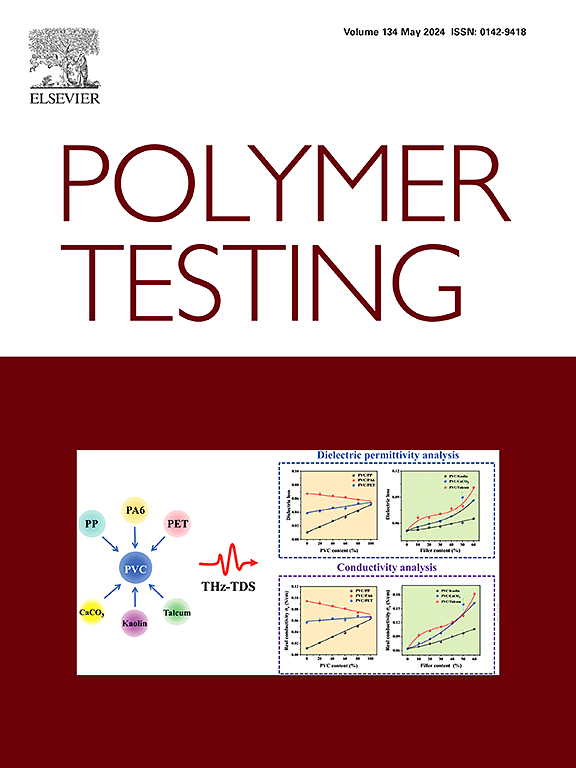热老化过程中 CL-20/HMX 共晶的特征及其对基于 GAP 的推进剂的影响
IF 5
2区 材料科学
Q1 MATERIALS SCIENCE, CHARACTERIZATION & TESTING
引用次数: 0
摘要
将 HMX 和 CL-20 作为成分颗粒加入可大大提高复合推进剂的能效。然而,当 HMX 和 CL-20 同时存在时会产生共晶。需要进一步研究确定 CL-20/HMX 共晶对推进剂老化特征的影响。本研究探讨了 CL-20/HMX 共晶的演变趋势及其对固体推进剂老化过程的影响。在 60 °C/180 天和 70 °C/90 天的温度下,对基于 GAP 的复合推进剂进行了热老化实验研究。对样品进行了密度瓶、差示扫描量热仪、X 射线衍射、傅立叶变换红外光谱和单轴拉伸测试。结果表明,在推进剂老化过程中,CL-20/HMX 的共晶行为经历了三个不同的阶段。在中间老化阶段,反应速度加快。随着基于 GAP 的推进剂的老化,最近形成的共晶结构会恶化推进剂颗粒与基体之间的界面特性,导致材料内部形成空腔。这将进一步加剧推进剂弹性模量、极限强度和最大伸长率的下降。其中,与未添加颗粒的推进剂老化行为相比,最显著的区别是弹性模量的增加。此外,还观察到弹性模量的变化与 CL-20/HMX 的共晶体含量之间存在很强的线性关系。这种相关性为监测共晶现象的程度提供了一个可靠的指标。本文章由计算机程序翻译,如有差异,请以英文原文为准。
Characterization of CL-20/HMX cocrystallization and its effects on GAP-based propellants during thermal aging process
The incorporation of HMX and CL-20 as component particles can greatly improve the energy efficiency of composite propellants. Nevertheless, the occurrence of cocrystallization arises when HMX and CL-20 exists together. Further investigation is needed to determine the effects of the CL-20/HMX cocrystallization on the aging features of the propellants. The present study examines the evolutionary trends and effects of the CL-20/HMX cocrystal on the process of solid propellant aging. Experimental thermal aging studies were carried out on GAP-based composite propellants at temperatures of 60 °C/180-day and 70 °C/90-day. An investigation of density bottle, differential scanning calorimetry, X-ray diffraction, Fourier transform infrared spectroscopy, and uniaxial tensile testing were performed on the samples. The results indicate that the cocrystallization behaviours of CL-20/HMX undergo three distinct stages during propellant aging. The reaction rate accelerates most during the middle aging stage. As the GAP-based propellant ages, the recently developed cocrystal structure deteriorates the interfacial characteristics between the propellant particles and the matrix, leading to the formation of cavities inside the material. This will further enhance the decrease in elastic modulus, ultimate strength, and maximum elongation of the propellants. Among them, the most notable distinction from the aging behaviours of propellants without the addition of particles is the increase of the elastic modulus. Furthermore, a strong linear correlation was observed between variation of the elastic modulus and the cocrystal content of CL-20/HMX. This correlation offers a reliable indicator for monitoring the extent of cocrystallization phenomena.
求助全文
通过发布文献求助,成功后即可免费获取论文全文。
去求助
来源期刊

Polymer Testing
工程技术-材料科学:表征与测试
CiteScore
10.70
自引率
5.90%
发文量
328
审稿时长
44 days
期刊介绍:
Polymer Testing focuses on the testing, analysis and characterization of polymer materials, including both synthetic and natural or biobased polymers. Novel testing methods and the testing of novel polymeric materials in bulk, solution and dispersion is covered. In addition, we welcome the submission of the testing of polymeric materials for a wide range of applications and industrial products as well as nanoscale characterization.
The scope includes but is not limited to the following main topics:
Novel testing methods and Chemical analysis
• mechanical, thermal, electrical, chemical, imaging, spectroscopy, scattering and rheology
Physical properties and behaviour of novel polymer systems
• nanoscale properties, morphology, transport properties
Degradation and recycling of polymeric materials when combined with novel testing or characterization methods
• degradation, biodegradation, ageing and fire retardancy
Modelling and Simulation work will be only considered when it is linked to new or previously published experimental results.
 求助内容:
求助内容: 应助结果提醒方式:
应助结果提醒方式:


